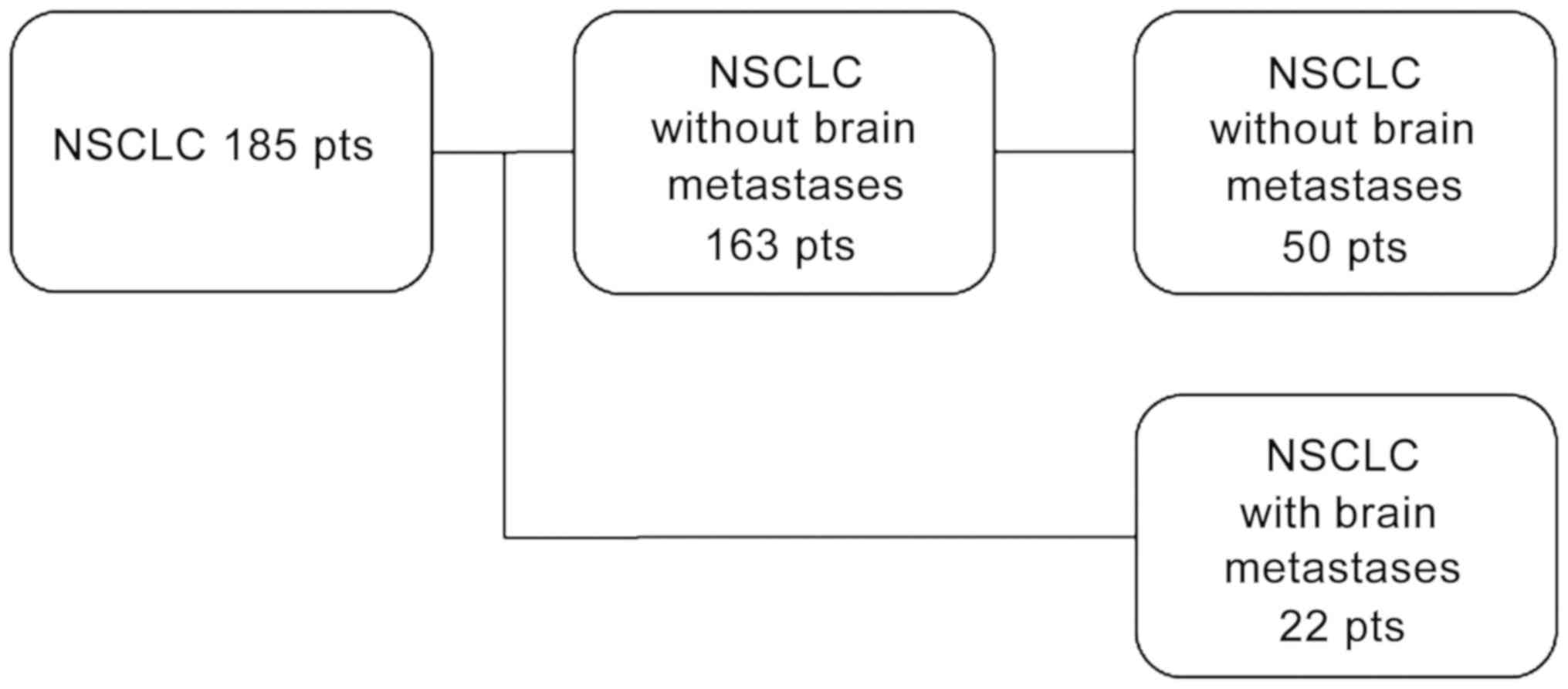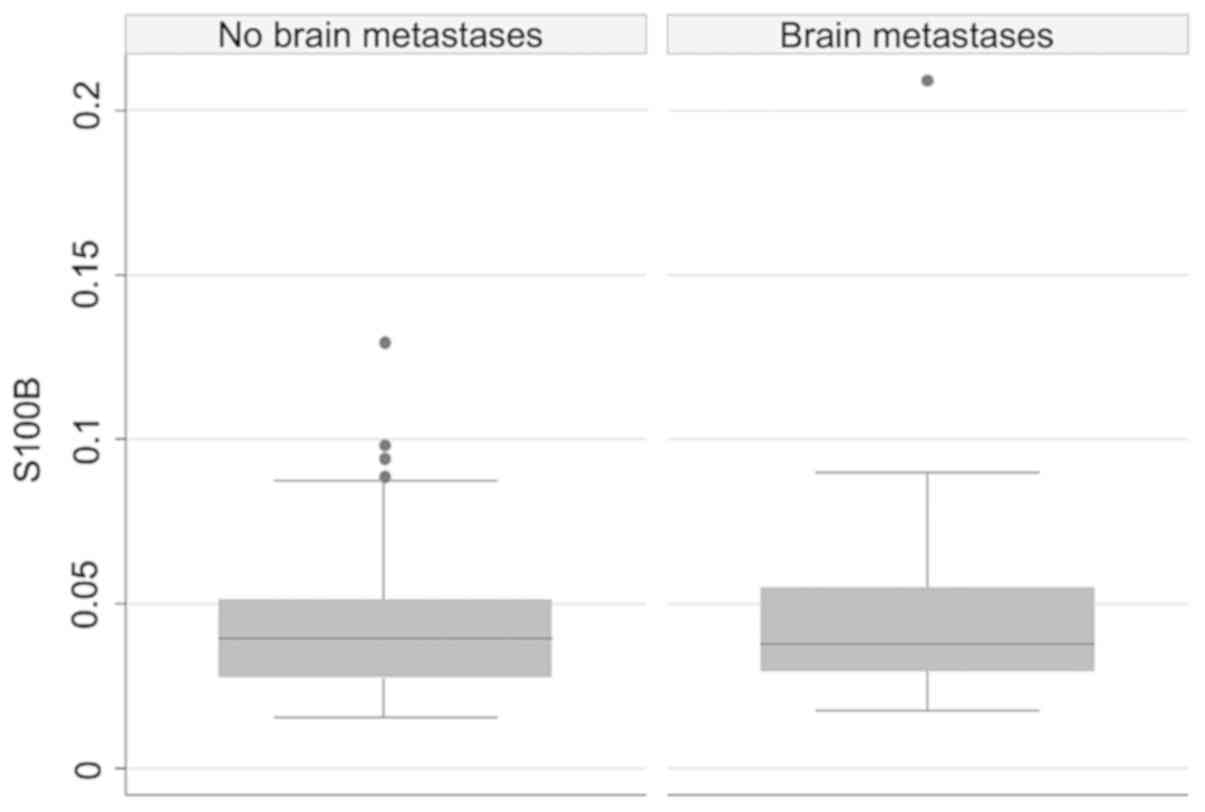|
1
|
Preusser M, Winkler F, Valiente M,
Manegold C, Moyal E, Widhalm Tonn JC and Zielinski C: Recent
advances in the biology and treatment of brain metastases of
non-small cell lung cancer: Summary of a multidisciplinary
roundtable discussion. ESMO Open. 3(e000262)2018.PubMed/NCBI View Article : Google Scholar
|
|
2
|
Choi H, Puvenna V, Brennan C, Mahmoud S,
Wang XF, Phillips M, Janigro D and Mazzone P: S100B and S100B
autoantibody as biomarkers for early detection of brain metastases
in lung cancer. Transl Lung Cancer Res. 5:413–419. 2016.PubMed/NCBI View Article : Google Scholar
|
|
3
|
Jiang W, Jia Q, Liu L, Zhao X, Tan A, Ma N
and Zhang H: S100B promotes the proliferation, migration and
invasion of specific brain metastatic lung adenocarcinoma cell
line. Cell Biochem Funct. 29:582–588. 2011.PubMed/NCBI View
Article : Google Scholar
|
|
4
|
Pang X, Min J, Liu L, Liu Y, Ma N and
Zhang H: S100B protein as a possible participant in the brain
metastasis of NSCLC. Med Oncol. 29:2626–2632. 2012.PubMed/NCBI View Article : Google Scholar
|
|
5
|
Korfias S, Stranjalis G, Papadimitriou A,
Psachoulia C, Daskalakis G, Antsaklis A and Sakas DE: Serum S-100B
protein as a biochemical marker of brain injury: A review of
current concepts. Curr Med Chem. 13:3719–3731. 2006.PubMed/NCBI View Article : Google Scholar
|
|
6
|
Lin J, Yang Q, Wilder PT, Carrier F and
Weber DJ: The calcium-binding protein S100B down-regulates p53 and
apoptosis in malignant melanoma. J Biol Chem. 285:27487–27498.
2010.PubMed/NCBI View Article : Google Scholar
|
|
7
|
Liu Y, Cui J, Tang YL, Huang L, Zhou CY
and Xu JX: Prognostic roles of mRNA expression of S100 in
non-small-cell lung cancer. Biomed Res Int.
2018(9815806)2018.PubMed/NCBI View Article : Google Scholar
|
|
8
|
Sandru A Voinea SV, Bolovan M, Cinca S,
Bordea C and Blidaru A: The significance of serum S100, MIA and LDH
in cutaneus malignant melanoma. Rom J Biolchem. 48:75–88.
2011.PubMed/NCBI View
Article : Google Scholar
|
|
9
|
Vos PE, Jacobs B, Andriessen TM, Lamers
KJ, Borm GF, Beems T, Edwards M, Rosmalen CF and Vissers JL: GFAP
and S100B are biomarkers of traumatic brain injury: An
observational cohort study. Neurology. 75:1786–1793.
2010.PubMed/NCBI View Article : Google Scholar
|
|
10
|
Vogelbaum MA, Masaryk T, Mazzone P,
Mekhail T, Fazio V, McCartney S, Marchi N, Kanner A and Janigro D:
S100beta as a predictor of brain metastases: Brain versus
cerebrovascular damage. Cancer. 104:817–824. 2005.PubMed/NCBI View Article : Google Scholar
|
|
11
|
Yoon SM, Choi YJ, Kim HJ, Shim JJ, Bae HG
and Yun IG: Prognostic value of serum s100 protein by elecsys s100
immunoassay in patients with spontaneous subarachnoid and
intracerebral hemorrhages. J Korean Neurosurg Soc. 44:308–13.
2008.PubMed/NCBI View Article : Google Scholar
|
|
12
|
Weide B, Richter S, Büttner P, Leiter U,
Forschner A, Bauer J, Held L, Eigentler TK, Meier F and Garbe C:
Serum S100B, lactate dehydrogenase and brain metastasis are
prognostic factors in patients with distant melanoma metastasis and
systemic therapy. PLoS One. 8(e81624)2013.PubMed/NCBI View Article : Google Scholar
|
|
13
|
Holla FK, Postma TJ, Blankenstein MA, van
Mierlo TJM, Vos MJ, Sizoo EM, de Groot M, Uitdehaag BMJ, Buter J,
Klein M, et al: Prognostic value of the S100B protein in newly
diagnosed and recurrent glioma patients: A serial analysis. J
Neurooncol. 129:525–352. 2016.PubMed/NCBI View Article : Google Scholar
|
|
14
|
Bechmann T, Madsen JS, Brandslund I, Lund
ED, Ormstrup T, Jakobsen EH, Jylling AM, Steffensen KD and Jakobsen
A: Predicting brain metastases of breast cancer based on serum
S100B and serum HER2. Oncol Lett. 6:1265–1270. 2013.PubMed/NCBI View Article : Google Scholar
|
|
15
|
Nygaard AD, Garm Spindler KL, Pallisgaard
N, Andersen RF and Jakobsen A: The prognostic value of KRAS mutated
plasma DNA in advanced non-small cell lung cancer. Lung Cancer.
79:312–317. 2013.PubMed/NCBI View Article : Google Scholar
|
|
16
|
Chen L, Hu X, Wu H, Jia Y, Liu J, Mu X, Wu
H and Zhao Y: Over-expression of S100B protein as a serum marker of
brain metastasis in non-small cell lung cancer and its prognostic
value. Pathol Res Pract. 215:427–432. 2019.PubMed/NCBI View Article : Google Scholar
|
|
17
|
Mu S, Ma H, Shi J and Zhen D: The
expression of S100B protein in serum of patients with brain
metastases from small-cell lung cancer and its clinical
significance. Oncol Lett. 14:7107–7110. 2017.PubMed/NCBI View Article : Google Scholar
|
















